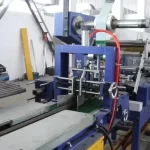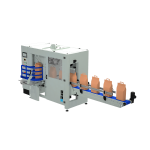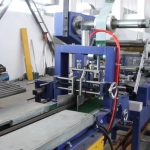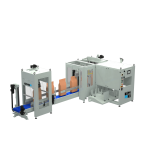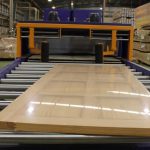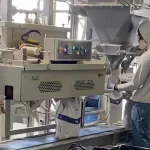automatic steel pipe in-feeding machine and bagging machine.
Pipe in-feeding machine:
Holds multiple racks of steel pipes of the same size
Feeds the pipes into the bagging machine at a controlled rate
Uses rollers, chain conveyors or pneumatic pushers to advance the pipes
Has a buffer section to compensate for fluctuations in bagging machine speed
Positioned above the bagging machine for gravity feeding of pipes
Bagging machine:
Contains a bagging hopper where open bags are loaded
Has a pipe inserting mechanism that indexes each bag and guides a pipe into it
Applies a tie wrap, seal or clip to close the bag around the pipe after insertion
Transfers full bags to a discharge conveyor
Control panel to set production speed and other parameters
Functions:
Empty bags are loaded into the bagging hopper
The in-feeding machine advances steel pipes onto guide rails above the bagging machine
A bag is indexed up from the hopper and opened
The pipe inserting mechanism guides a pipe from the feed into the open bag
The bag is closed around the pipe using a tie wrap, heat seal or clip
The full bag is discharged onto the conveyor
The process repeats continuously
Benefits:
Higher throughput by automating manual bagging
More consistent packing due to precision pipe insertion and bag closing
Less waste from tearing bags since they are automatically indexed and opened
Easy to integrate into existing automation lines
So in summary, an automatic pipe in-feeding machine works with a bagging machine to rapidly and precisely insert steel pipes into bags, closing them in an organized fashion to improve packing consistency and throughput.
